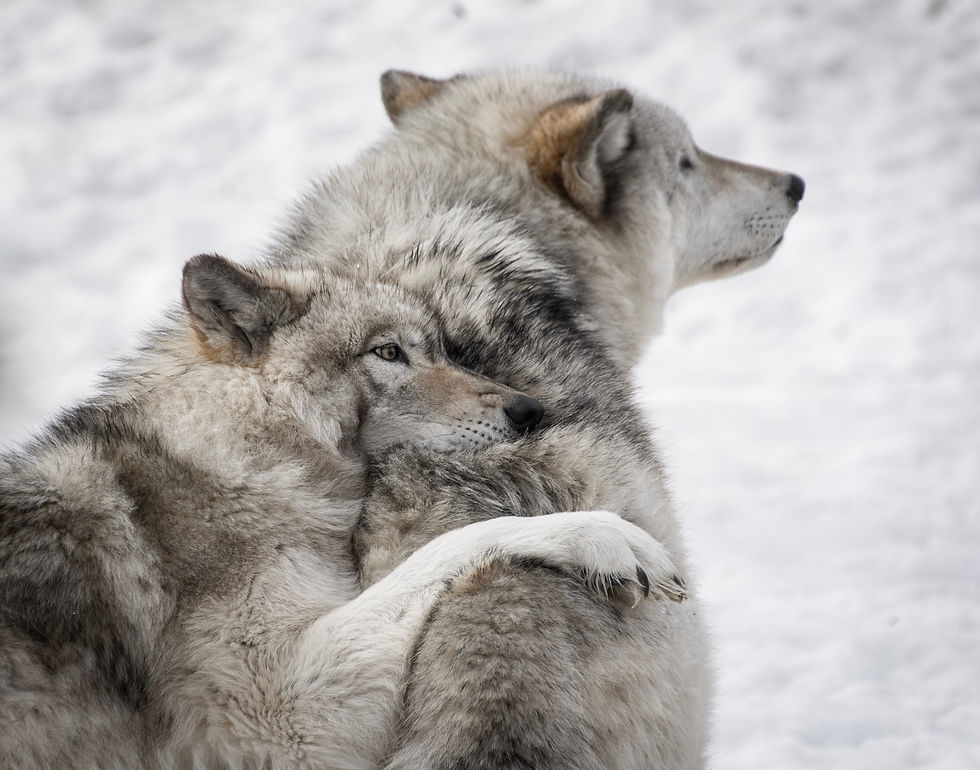The term ‘dominant’ is often used to describe dogs, but what does it really mean? And more importantly, does it have any place in modern dog training? Let’s explore the truth behind this outdated myth.
What does dominance actually mean?
Let’s start by defining dominance. The Oxford Dictionary of Animal Behaviour describes it as 'a feature of social organisation in which some individuals acquire a high status, usually through aggression, while others retain a lower status'. In nature, dominant individuals might obtain priority access to food or mates by asserting themselves over others. However, dominance isn’t a fixed trait of a single animal; it describes the relationship between animals in a group in relation to a particular resource. So, dominance is situational and varies depending on the environment and context.
Dominance in wolves – and why it doesn't apply to dogs
Many dog owners are familiar with the idea of the ‘alpha wolf’, a concept popularised in the 1970s by David Mech. He initially claimed that wolves fought for dominance within packs, but later retracted his theory. Mech observed that the behaviour he described was the result of captive wolves being forced to live in close proximity to unrelated pack members in an unnatural environment. In the wild, wolf packs function as family units, with the ‘alpha wolves’ simply being the breeding pair.
Even if the concept of the 'alpha' animal did apply to wolves, it doesn’t automatically transfer to domestic dogs. In fact, dogs and wolves are quite genetically different – think of them as distant cousins, rather than direct descendants. Dogs have evolved to be more reliant on humans, and their social structures are far more flexible and less hierarchical than those of wolves.

Can we be the ‘pack leader’?
You’ve probably heard advice like 'always eat before your dog' or 'walk through doors first' to establish yourself as the ‘pack leader’. However, dogs don’t perceive these actions the way we think they do. Whether you eat before or after your dog makes no difference to them – they’re simply happy to get fed. So, the idea that you must assert dominance through these small rituals is misleading and unnecessary.
The misapplication of 'dominance theory' in dog training
Now let’s discuss how dominance is often misapplied in dog training. Some trainers claim they’ve taught their dog who’s ‘in charge’ by using physical punishment, like yanking on a slip lead when the dog pulls. In these cases, the dog is not respecting the owner’s ‘dominance’; instead, they’re learning to avoid pain or discomfort. This is known as avoidance learning.
Worse still, punishment-based methods built around dominance can lead to serious issues, including fear, anxiety and aggression. For example, techniques like alpha rolls (forcing a dog onto its back to show submission) can cause severe behavioural problems and damage the trust between you and your dog. If this approach works, it’s often at the cost of the dog’s emotional well-being, and you might find more serious issues cropping up down the line.

It’s about the relationship – not dominance
So, what’s the real takeaway from all this? The key is not to try and be your dog’s ‘alpha’ or dominant leader – it’s to build a relationship of mutual trust and respect. I want my dogs to listen to me because they enjoy working with me, not because they fear punishment.
Positive reinforcement works wonders for building that bond. For example, my dog Lyra (with her high prey drive) turns on a dime to come back to me mid-way through a chase, simply because she knows she’ll get to play with a tug toy.
So, my advice to you is this: stop focusing on dominance, and focus on creating a positive, mutually beneficial relationship with your dog. Through fun training and play, you can teach your dog what’s expected of them while ensuring they feel happy, secure and motivated.
Ready to build a stronger bond with your dog?
If you’re ready to ditch the dominance myths and build a stronger relationship with your dog, I’d love to help. My approach focuses on positive, trust-based training to create lasting improvements in your dog's behaviour (but I won't judge you for methods you may have used in the past).
Explore my services or contact me today to learn how we can work together to transform your dog into a happy, well-behaved companion who trusts you completely.
